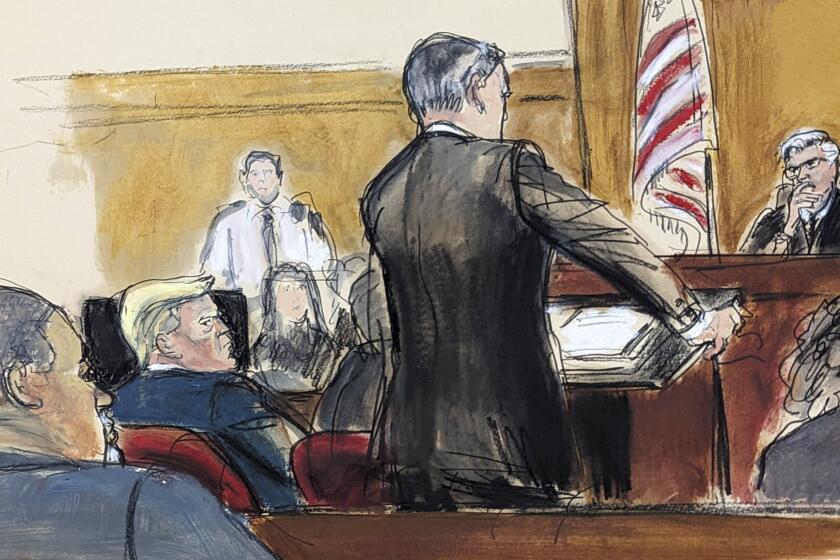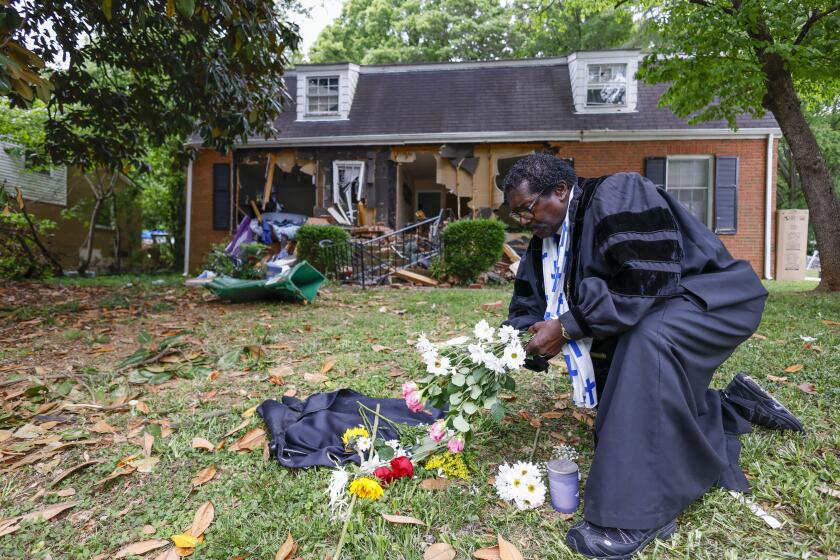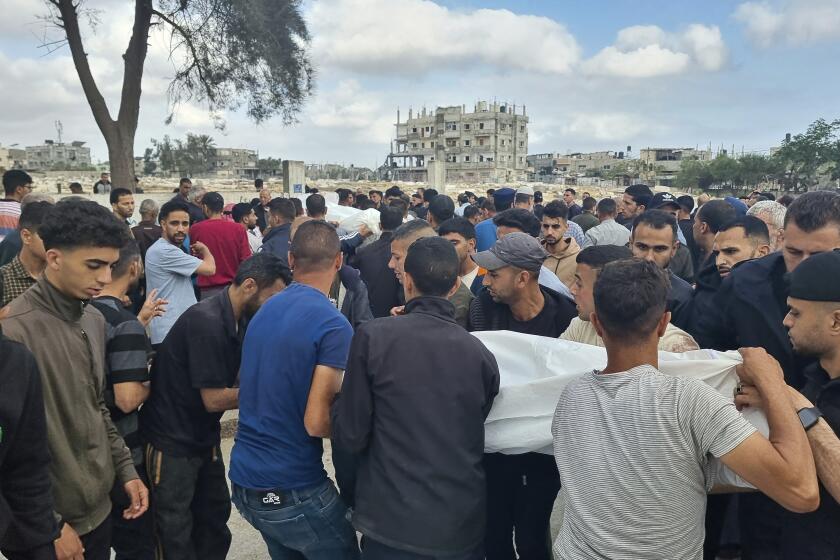Tunisia gets another president, its third in 24 hours
The leadership of this troubled country changed hands for the second time in less than 24 hours Saturday as security forces and ordinary Tunisians struggled to quell mayhem that some have attributed to henchmen loyal to ousted President Zine el Abidine ben Ali.
Fouad Mebazaa, president of the lower house of the parliament, was sworn in as chief of state amid fast-moving political developments and chaotic lawlessness that have transformed Tunisia into a symbol of revolution in the Arab world.
Mebazaa, 77, became the national president less than a day after Ben Ali fled to Saudi Arabia, handing power to his prime minister, Mohamed Ghannouchi, whose appointment sparked new demonstrations and questions about constitutional propriety. Mebazaa promised in a televised speech to consult with all political parties before holding elections within 60 days.
“I urge you all, and all dynamic forces of political parties, national organizations and components of civil society to put national interest first and to help the armed forces and national security in maintaining security and in protecting private and public property, and to restore calm and tranquillity to all citizens,” he said.
With video of the uprising airing constantly on satellite television throughout the region, the events in Tunisia have captivated Arabs who hope it will inspire the toppling of other entrenched authoritarian regimes. That has raised the stakes for a people’s power rebellion that could be threatened by the continuing violence.
Tension and confusion gripped the streets, where many residents spent hours searching for bread and other food.
Army tanks were positioned in the heart of Tunis, along the capital’s main Avenue Habib Bourguiba. Death toll figures were not available, but scores of people across the nation have died in the unrest, including 57 reportedly killed Saturday in an inferno at a prison.
As a 5 p.m. curfew approached, surly young men appeared to be gathering steam for another night of clashes with police officers, who stalked sidewalks wearing riot gear and holding clubs, menacing pedestrians who didn’t move quickly enough.
As night fell, occasional bursts of gunfire could be heard throughout Tunis and its suburbs, as well as the occasional roar of army helicopters roaming the skies.
Common criminals and overzealous young demonstrators have contributed to the spasm of looting and violence in this previously placid and tightly controlled North African country. But just as loyalists to Iraq’s Saddam Hussein set off fires and released prisoners in the wake of his 2003 ouster by U.S.-led forces, security officials loyal to the autocratic Ben Ali, many Tunisians suspect, have played a role in the unrest here.
“These are not ordinary people,” said Bochra Belhaj Hmida, a lawyer and human rights activist. “They are at risk because they tortured people. They are going to be condemned for their crimes if they are arrested.”
The country’s constitutional court ruled Saturday that the departure of Ben Ali, driven out of office Friday after weeks of protests over rising food prices, unemployment and a lack of political freedom, was permanent. And France, the former colonial power that had long backed Ben Ali, asked relatives of the former president who had entered the country to leave and announced the launch of investigations of suspicious money transfers between Tunisia and France.
Many Tunisians suspect that former members of Ben Ali’s presidential guard, his most brutal adjutants in the Interior Ministry and loyalists in his ruling Constitutional Democratic Rally were fomenting the violence to discredit the protesters and contribute to chaos that would justify harsh security measures.
“These are people from the ex-government who are orchestrating everything,” said Mokhtar Trifi, president of the Tunisian Human Rights League, an opposition group.
Officials of the interim government could not be reached for comment. But there were signs that security forces loyal to the interim government, especially the army, were trying to beat back efforts by the former regime to spread chaos.
Al Jazeera pan-Arab satellite television network reported the arrest of Ali Seriati, the head of Ben Ali’s despised presidential guard. In the capital’s November 7 Square, police fatally shot two of their own, explaining to a European journalist at the scene that the pair were former regime loyalists who were responsible for crimes.
Mohammad ben Ghomdhan, head of a small socialist political party, Renewal, that is conferring with the interim government, said officials had told him Saturday that during the preceding two days, soldiers at army checkpoints had seized two armored Interior Ministry vehicles filled with weapons.
On television shows, on the Internet and in the few cafes that remained open in the capital, many said they feared that security officials close to Ben Ali also were responsible for an outbreak of violence at the country’s prisons. Al Jazeera cited a medical source as saying 57 people had died in a fire at a prison in Monastir, about 80 miles southeast of the capital, amid reports of attempted escapes at at least two other detention facilities.
Al Jazeera also reported that political prisoners held at Borj Roumi prison in the northern port city of Bizerte had been released. It was not clear who had given the order to free them.
On the streets, the tension between the population and the police, which answers to the Interior Ministry, was palpable, as was the higher status that Tunisians accord their army.
When police officers tried to detain a young man at the square near the Republic Metro station, a crowd waiting for a tram erupted with fury, moving toward the officers and tossing rocks. The police fired teargas volleys, but the crowd only got angrier and moved closer.
“We are not afraid!” they chanted.
A group of soldiers ran into the square to intervene, forcing the police to release the man. The crowd cheered the man as he boarded the tramway platform.
Numerous videos posted on the Internet during the weeks of protest showed police officers in uniform smashing shop windows and setting fires. In the hours after Ben Ali stepped down, residents of the Manar and Menzah neighborhoods of Tunis reported spotting vans dropping off people armed with clubs and canisters of gasoline to start fires. Some of the witnesses said the vehicles were escorted by police.
Ben Ghomdhan said that unlike in post-invasion Iraq, where the U.S. disbanded the army and regime stalwarts were able to organize an insurgency in the ensuing power vacuum, Tunisia’s interim government and relatively popular army were already a step ahead of the Ben Ali loyalists.
“I think they cannot win,” he said. “These networks have been identified, from the information that I have so far. Their chief, Seriati, has been arrested, and many of his networks have already been arrested.”
Special correspondent Sihem Hassaini contributed to this report.
More to Read
Start your day right
Sign up for Essential California for news, features and recommendations from the L.A. Times and beyond in your inbox six days a week.
You may occasionally receive promotional content from the Los Angeles Times.






